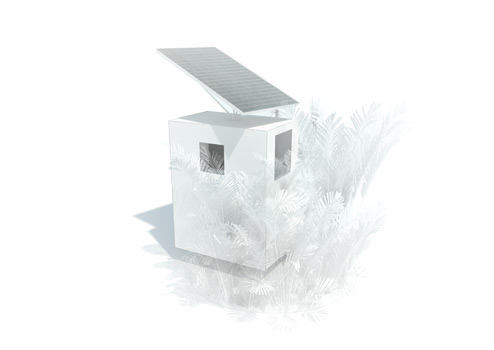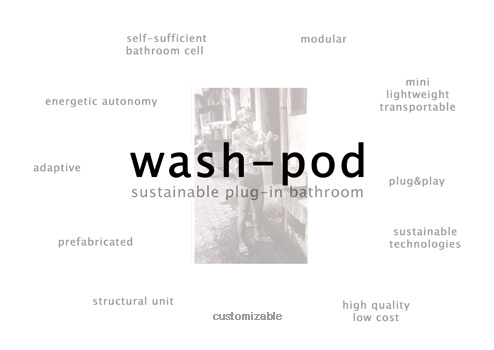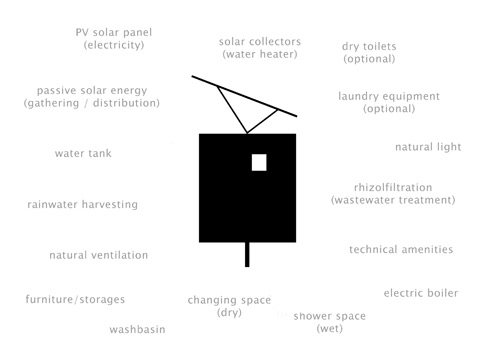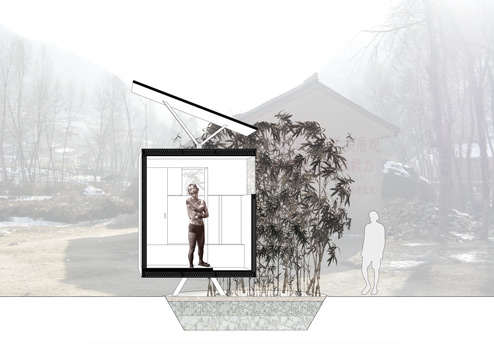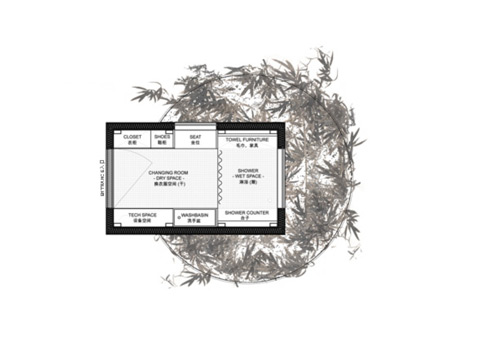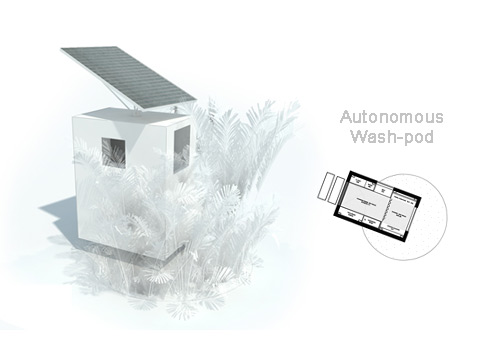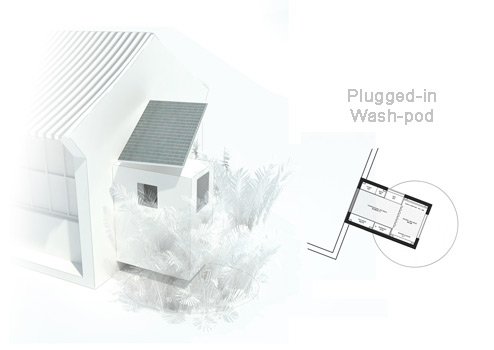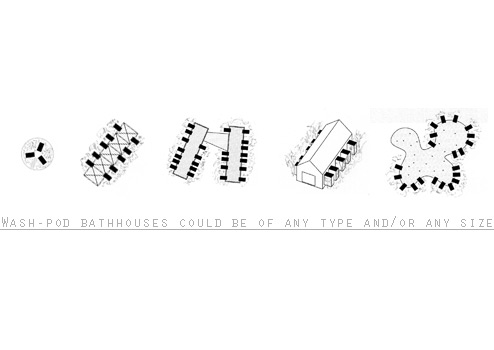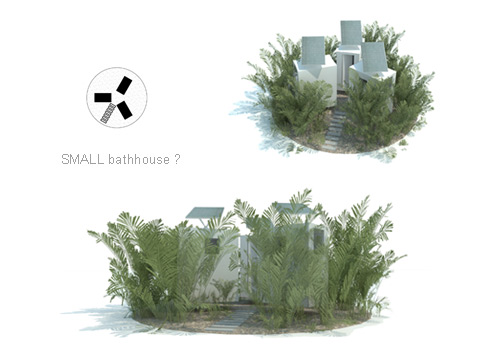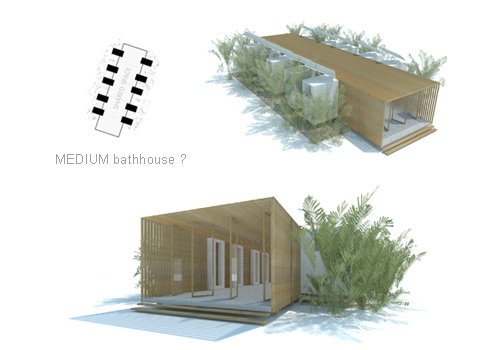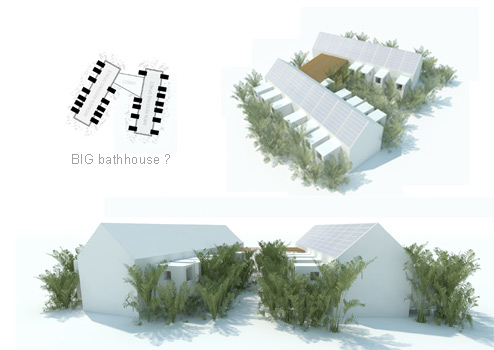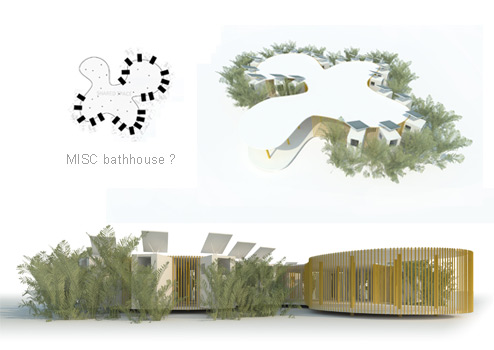

. . . . . Wash Pod . . . . .
BaO's 2011 completion of the Shanmen bathhouse in Gansu has triggered a self-comissioned research on the implementation and reproducibility of community-based, low-cost, sustainable, sanitation equipments in developing countries. From the start, the design of a supposedly universal architectural model that would be repeated in different location seemed naive, inadapted, inadaptive, and neither effective nor desired. We thus decided to focus our efforts on creating a system, a tool, for building bathhouses instead of a bathhouse building.
The main idea behind the Wash-pod concept is to reduce the Eco-bathhouse problematic to a single and autonomous bathroom cell. We believe that the conceptual breaking-apart of a bathhouse into a series of independent and self-sufficient elements permits maximum efficiency on both the construction process and the operation of community bathhouses. The Wash-pod project, with its obvious reference to Japanese metabolism or Archigram's plug-in cities to only cite a few, is a kind of pragmatic utopia, an idea that consiously flirts with both down to earth realism and pure speculation.
Wash-pod has just received the WB2012 Award in Mumbai India for its "innovative design for public sanitation facilities", and is currently in R & D phase.
:: Autonomous cell ::
By focusing all effort on one self-contained space equipped with an individual changing room, a washbasin and a shower, it is hoped that the Wash-pod would permit a greater flexibility for bathhouses construction. On one hand theoretically any size of bathhouse could be built with the same basic unit. On another hand, the Wash-pod being a single bathroom unit, it could not only suit community bathhouses projects but also a growing individual households market.
The Wash-pod is considered as a wholly sustainable and energetically autonomous cell. The objective is to not only avoid energy waste and environmental impact but also to reduce drastically operative costs and simplify management. Indeed every "cell" would produce and use its own hot water and heated space as opposed to usual bathhouses that, even when used only by one person for instance, constantly have to heat up huge amount of water and air. The Wash-pod functions like a plug and play "human washing machine", it only necessitates to be plugged on local water systems and electricity (backup for the PV solar panels).
:: Prefab ::
Prefabrication would permit to solve most of the complex and technical elements of the conception/construction of eco-bathhouses. It would guaranty quality and precision in water-related, sustainable, heating, and constructive technologies as well as a much greater control on costs. On-site construction would be limited to the construction of common areas, setting up water and electricity networks and preparing simple pad foundations on which the pods would be mounted. The prefabrication principle is interstingly enabling a new type of architectural hybrid construction. The on-site construction is reduced to simple walls and roofs for common areas without technical difficulties and can be achieved by local labor in basically almost any shape, any material or any local construction methods. The wash-pods could also be directly plugged on existing building that one wishes to transform in a bathhouse. The flexibility of the hybrid construction process would provoke a rich array of inventive solutions and make every bathhouse unique.
:: Wash-pod bathhouses ::
The main purpose of the Wash-Pod project is to propose a flexible solution for either individual households lacking sanitary facilities (retrofitting with shower/wc) or implementing collective bathhouses of various sizes and types in different contexts. Our approach aims in a broader sense at promoting sustainable and low-tech development and ultimately provoking the creation of public service types of social entrepreneurship.
The single module would theoretically permit to produce thousands of different bathhouses. Wash-pods being autonomous cells and their price invariable, one could estimate the required quantity and combine them together in accordance with the site, the specific need, the ambition, and the financial means of collectivities or local entrepreneurs. Costs are firmly controlled, quality guarantied and flexibility of the models maximized with minimum risks. The system also permits Wash-pod bathhouses to easily expand if the demand increases and the business is going well. Alongside the Shower Wash-pods, we also intend to design and produce dry toilets cells and washing machines cells.
BaO is looking for support and partnership to further develop the project. Upon interest, please feel free to contact us.
. . . . . . . . . . . . . . . . . . . . . . . . . . . . . . . . . . . . . . . . . . . . . . . . . . . . . . . . . . . . . . . . . . . . . . . . . .

